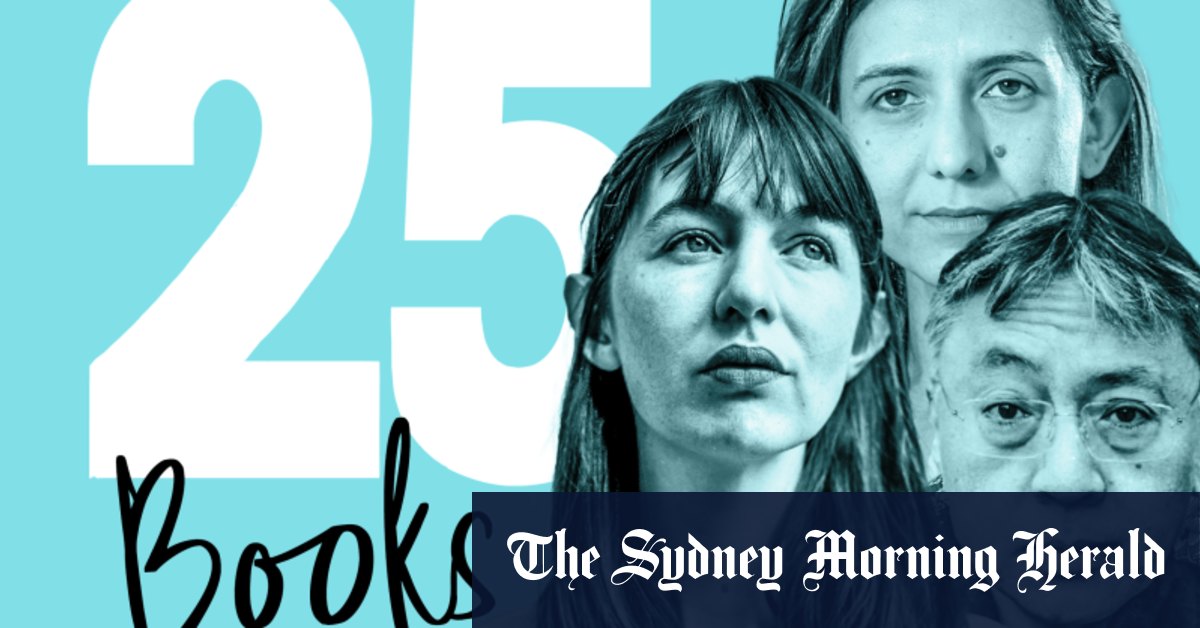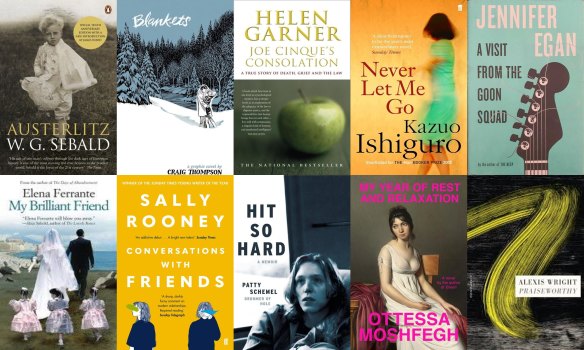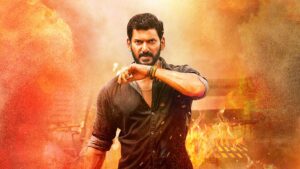
Hold onto your bookmarks. The list of our 10 most-loved books published since 2000 spans the literary, experimental and translated as well as true crime, science fiction and memoir genres. Some will make you cry, others will make you laugh – the best will have you doing both. Choosing only 10 books from 25 years means there are notable absences, but the list offers a sketch of the books that have shaped us and our world since the start of the millennium. Our writers, critics and editors were asked to consider their personal favourites – the books that will always have a place on their shelves – as well as quality, influence and legacy. How many have you read?
Austerlitz, W G Sebald (2001)
W G Sebald was the German master who invented contemporary “faction”, and Austerlitz is the last of his longer works and the one which most resembles a novel. The main character shares a name with the famous Napoleonic battle and he speaks in moody and melancholic arias of desolation over a period that stretches from the 1960s to the 1990s. Austerlitz hates the aggressive brutality of the architecture of Antwerp and exhibits a depth of melancholy that is the basic idiom of his self-delineation and Sebald’s characterisation. This is a mutation of fiction which has the self-validating intensity of great poetry. Austerlitz is a labyrinth of a book in which dream worlds and real worlds shatter and collide. It’s manifestly a masterpiece, perhaps the very greatest of those works which insinuate and actualise the way in which the mind transfigured the world it depicts. Peter Craven
Blankets, Craig Thompson (2003)
There was once a time when comic books were considered child’s play – throwaway fluff for the emotionally and socially stunted. At the turn of the millennium, the great graphic novels boom happened and suddenly everyone realised they’d unfairly dismissed the literary potential of books with pictures. Marjane Satrapi’s Persepolis, Chris Ware’s Jimmy Corrigan and Alison Bechdel’s Fun Home were among the era’s most acclaimed titles, alongside my moody favourite Craig Thompson’s Blankets – a romantic and melancholic coming-of-age story charting the author’s world-opening first love and spirited questioning of his religious upbringing. It all plays like a Softies song – deeply evocative and earnest and reflective, Thompson’s snow-dotted panels are filled with the sort of quiet space that stops you in your tracks repeatedly, something run-on sentences could never do. As my copy’s coffee-stained jacket, quoting Pulitzer winning cartoonist Jules Feiffer, somewhat defensively suggests: “I’d call that literature.” Robert Moran
Joe Cinque’s Consolation: A True Story of Death, Grief and the Law, Helen Garner (2004)
These days, we’re inundated with true crime content — podcasts, documentaries, books and TV shows — but none come close to the moral inquiry, literary craftsmanship and utter elegance of Helen Garner’s Joe Cinque’s Consolation. The non-fiction work follows the murder trial of Anu Singh, a law student at ANU in Canberra, and her best friend, who were accused of murdering Singh’s boyfriend, engineering student Joe Cinque, in 1997 with a lethal dose of heroin and Rohypnol. Singh had allegedly organised two dinner parties before the murder, hinting to her friends about her plans, but none intervened. Garner’s work avoids easy conclusions and oversimplification, combining sharp analysis with deep empathy to transform a personal tragedy into a universal exploration of justice, grief and human frailty. If only this self-reflective, philosophical book was the standard for all works about true criminal cases. Melanie Kembrey
Never Let Me Go, Kazuo Ishiguro (2005)
Kathy, Ruth and Tommy are special children growing up in a curiously old-fashioned boarding school with kind teachers. Already the place and time is lit with a nostalgic glow. Kathy, now an adult, looks back without rancour on those formative years and the close ties with her two friends. Gradually, the world surrounding the school is revealed. You may see the twist coming, but it doesn’t matter, because Never Let Me Go is unexpected in different ways. Kazuo Ishiguro’s delicate handling transcends his science fiction premise and in simple understated language graced with dignified euphemisms tells us a complex and profoundly moving love story. The reader may be shocked and angry, but the characters never are, and we respect that. Kathy’s memories add up to a meditation on human connection, what we can keep and what we have to lose. The last scene, in which Kathy contemplates rubbish flapping on a barbed wire fence, has never left me. Jane Sullivan

Ten must-read books published since 2000.
A Visit from The Goon Squad, Jennifer Egan (2010)
“Time’s a goon, you gonna let that goon push you around?” says Scotty Hausman. He’s a failed guitarist who leaves a dead fish in the office of a friend whose success he resents in A Visit from the Goon Squad, Jennifer Egan’s ode to Proust by way of The Sopranos that I devoured when it came out. Egan’s kaleidoscopic 2010 novel follows unforgettable characters including a kleptomaniac called Sasha Blake and Bennie Salazar, a punk rocker-turned-ageing record executive who sprinkles gold flakes in his morning coffee in a bid to feel again. It’s often praised for its formal daring: its interlocked narratives shuttle back and forth and one of its best chapters is written as a PowerPoint presentation. But to me, the novel’s ability to evoke time’s quieter tragedies — the ghosts of youth, the slow sapping of desire, the choices that distance us from those we most love – that make it profound. Neha Kale
My Brilliant Friend, Elena Ferrante (2011)
The Italian novelist Elena Ferrante is an elusive figure. The name is a pen-name; Ferrante’s true identity is officially unknown. What we know is that she has published a quartet of evidently autobiographical novels, collectively called the Neapolitan Novels, which prove that fiction in the 21st century can still scale the exhilarating heights that Proust scaled in the 20th. My Brilliant Friend, the disturbing and beautiful first book of Ferrante’s sequence, centres on the narrator’s childhood friendship with the unforgettable Lila. Both girls are ambitious and courageous; both struggle to transcend the limits of the oppressively male world around them. Like Proust, Ferrante has an uncanny memory. She recalls the passions and traumas of her girlhood as if they happened yesterday. The story she tells is in one sense local and particular. But she tells it with a piercing urgency that transforms it into something universal, which has resonated with millions of readers worldwide. David Free
Conversations with Friends, Sally Rooney (2017)
Before every book marketed to Millennial women became stamped with a cursory “for fans of Sally Rooney”, there was Conversations With Friends, the book that kicked off the Irish author’s career and, arguably, an entire literary genre. Despite having released three novels since – each a success in their own right – Conversations is still Rooney at her best. Ultimately, this is a book about relationships: the friendship between college students, poets and former lovers Frances and Bobbi; the marriage between alluring older couple Melissa and Nick; the addictive and, honestly very hot, love affair of Frances and Nick; and the bloodied relationship between Frances and her body.
Being a Rooney fan may have become somewhat of a cliche (though one much less painful than that of her literary haters, in my opinion), but there’s no denying this book changed what we considered possible in fiction for, and about, young women. Gyan Yankovich
Hit So Hard, Patty Schemel (2017)
I’m sorry, but Patty Schemel’s memoir of drugs, sex(uality) and existential annihilation is rock and roll. The prose is clean, rigorous and every bit as pacy as Schemel’s drums thrashing and churning during Live Through This. You don’t necessarily need to care about Seattle grunge, riot grrrl, textured portraits of Kurt Cobain (whose pathos Schemel perfectly evokes here) or exactly what it’s like to throw a puppy-shaped backpack full of Anne Rice paraphernalia at Courtney Love, to appreciate this memoir. Just savour the unexpected, ambient turns of phrase (an addict’s excuses and escape plans, their little bouts of salvation bargaining: the “geographic cure”; Courtney Love playing Melbourne’s Big Day Out with Hole: a “radiant nightmare”.) There is, too, the affecting gallows humour, as in the unexpected punchline to a story of someone casually injecting heroin in their neck during casual conversation; or the eerie moment Schemel, watching the news, sees her own picture displayed during reports of the death of a fellow Hole member. Dumpster-diving, so to speak, through LA dreams and Madonna’s garbage, all while maintaining the kind of stoicism Marcus Aurelius would kill for, Schemel’s voice – graceful, resonant, beguiling – convinced me that, sometimes, the only way out is through. Declan Fry
My Year of Rest and Relaxation, Ottessa Moshfegh (2018)
My Year of Rest and Relaxation is an exercise in hypnotised reading. Such is the skill of Ottessa Moshfegh, taking us through the story of an appallingly beautiful 26-year old woman who embarks on an ambitious self-imposed quarantine to sleep for a year. The unnamed narrator is a rich, skinny orphaned elite. She approaches her voluntary isolation with the focus of a cyclist about to tackle the Tour de France. It’s mid-June 2000 when her drug-induced hibernation begins. “I didn’t do much in my waking hours besides watch movies,” she announces in the opening pages. Her dogged attempts to detach herself from reality are thwarted (or aided) by a pair of hilarious sidekicks – her psychiatrist, Dr Tuttle, a turtle-neck wearing quack who encourages 14 hours of sleep; and Reva, the painfully jealous loyal friend who suffers from a degree of self-loathing that makes her both utterly detestable and endearing. Saying no to the world that was not made for women, this text therefore feels resolutely feminist. Our heroine’s utter denial of stimuli feels both outrageous and inspiring. No other book captures the sweet malaise that was the late ’90s, pre-9/11 New York era. Jessie Tu
Praiseworthy, Alexis Wright (2023)
Loading
Praiseworthy is a canon-crushing Australian novel for the ages – a grand, whirling hymn of everywhen. Wright’s real-life frustrations at the indignities of the Anthropocene stalk the pages of this bitterly funny book. When a methane-like haze settles over the once-tidy town of Praiseworthy, a dreamer – Cause Man Steel – sees an opportunity to capitalise on this new, ferocious era of heat. There’s a fortune to be made, deliverance to be found. Is he a schemer or a visionary? Prophet or fool? His journey will be as absurd as it is epic – a Don Quixote of the dust. “I believe literature must meet the scale of what is happening in the world,” Wright explains. “We have to, even foolishly, believe that anything can be done in life or in literature with deep thought”. Praiseworthy is not just the product of deep thought, but an invitation – a mighty and generous invitation – to do the thinking for ourselves. Beejay Silcox
Honourable mentions
Things I Didn’t Know: A Memoir, Robert Hughes (2005)
Wolf Hall, Hilary Mantel (2009)
Outline, Rachel Cusk (2014)
Lincoln in the Bardo, George Saunders (2017)
The Overstory, Richard Powers (2018)
What books do you think deserve a place on the list? Tell us in the comments.



